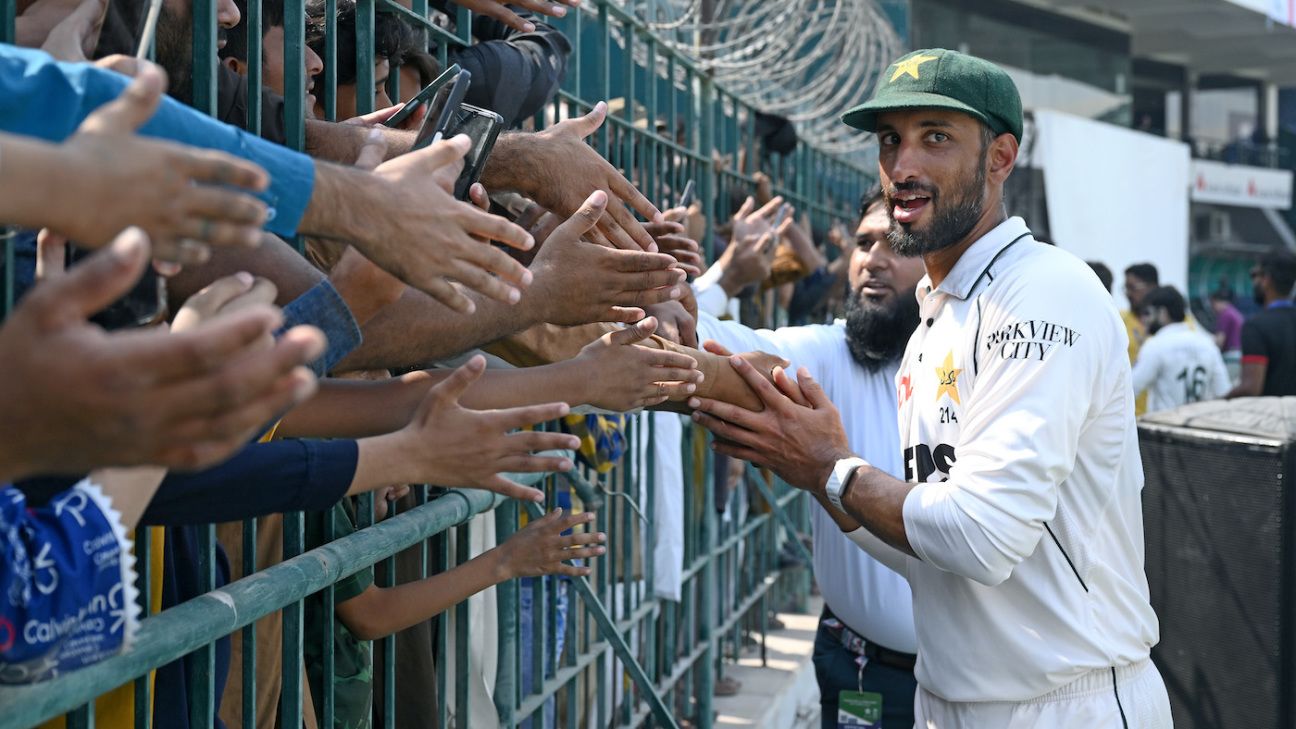Pakistan's Test captain
Shan Masood said
Babar Azam's "break" from the Test squad will end up benefitting rather than harming him.
Babar was omitted from the Pakistan squad for the last two Tests against England, which Pakistan won to claim the series 2-1, after a prolonged lean patch.
"I think he's one of the best batsmen in the world. I'm nobody to [say he doesn't have] a future," Masood told the BBC Stumped radio programme. "He has every quality to be one of the greatest batsmen in Test cricket. He's always there or thereabouts in the rankings. Sometimes, people need a break."
Pakistan have been swift to indicate Babar has not entered a period of international wilderness,
calling him up for Pakistan's twin white-ball series against Australia. It starts with a three-match ODI series - the first since Pakistan's disappointing World Cup campaign that saw Babar reluctantly quit as captain. Pakistan have gone so long without playing a 50-over international that in the time since, Babar was reappointed white-ball leader and quit once more, all without having led the side in the format.
But, in the clearest signal yet that Babar's absence from Pakistan's Test side will be temporary, Masood said he expected him to "come back a stronger player". Babar has not scored a half-century in Test cricket in 18 innings stretching back to late 2022, Pakistan's next Test series is in South Africa, an opposition he has had some happy Test memories against. South Africa were Pakistan's first opposition when Babar became Test captain as he led his side to a 2-0 series victory. In 2018, his assault on Dale Steyn in a blistering counter-attacking innings at SuperSport Park was widely
seen as Babar's Test coming-of-age.
"I think this break will do him a great deal of benefit and he'll come back a stronger player," Masood said. "There's no harm in being pulled out at times and having a breather. He's played a lot of cricket and gone through a lot, and he'll always be one of the main batsmen to play for Pakistan."
Masood was less willing to be drawn in on the specifics of what his role entails. After the PCB appointed a new selection committee following a chastening innings defeat in the first Test against England, the captain - as well as the head coach
Jason Gillespie - were removed from the selection panel. Gillespie called himself a "matchday strategist" in the press conference that followed, and said it
"wasn't what I'd originally signed up for". The change also applied to white-ball coach Gary Kirsten,
who resigned earlier this week.
Masood said he had a good relationship with the incoming selectors, insisting he wanted to focus on the team instead of focusing on where individual credit should be apportioned. "People in Pakistan are quick to give success to individuals," he said. "To make one person a hero. I think it's always going to be a collective thing. I'd rather pass credit onto everyone else; it was a collective decision. When we sat down together in our first meeting, we were on the same page. We said 'we need to take 20 wickets, how do we take 20 wickets?'
"We thought playing on a used pitch, playing three spinners - that, we thought, would benefit us greatly. I've worked with three different setups in my tenure so far. My first series in Australia was different, the Bangladesh series was different, and then we've had this group of people that were involved in selection and leadership. I've been on the same page with them so far. At the end of the day, it's about Pakistan cricket, and we're very fortunate that the entire collective came together."
There were less consequential, if more combustible, issues at hand, too. Moments after the Pakistan captain struck the winning six, he sat down for an interview with the host broadcaster, which
involved a few awkward exchanges with commentator
Ramiz Raja, with Raja querying Masood clumsily about how he had led the side to six consecutive defeats. A trimmed version of the exchange went viral, with much criticism for Raja, who later posted a video clarifying the intent behind his questions.
"There are no hard feelings from my side," Masood laughed. "I've always been an open book in front of the media and tried to conduct myself in the best possible way. People have every right to ask questions however they want. I want to give the best account of myself and for my character to be reflected the way I am. I'm good at taking constructive criticism and I'm also good at filtering stuff out."
















 Phone: (800) 737. 6040
Phone: (800) 737. 6040 Fax: (800) 825 5558
Fax: (800) 825 5558 Website:
Website:  Email:
Email: 






